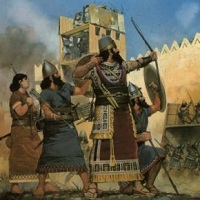
Assyrians
CBUB Wins: 0
CBUB Losses: 0
CBUB Ties: 0
Win Percentage: 0%
Added by: CrinosVegeta
Read more about Assyrians at: Wikipedia
Official Site: Public Domain
Assyria was a kingdom centered on the Upper Tigris river, in Mesopotamia (Iraq), that came to rule regional empires a number of times through history. It was named for its original capital, the ancient city of Assur (Akkadian: ; Arabic: ; Hebrew: , Aramaic: . The term Assyria can also refer to the geographic region or heartland where these empires were centered.
During the Old Assyrian period (20th to 15th centuries BC), Assur controlled much of Upper Mesopotamia and parts of Asia Minor. In the Middle Assyrian period (15th to 10th centuries BC), its influence waned and was subsequently regained in a series of conquests. The Neo-Assyrian Empire of the Early Iron Age (911 – 612 BC) expanded further, and under Ashurbanipal (r. 668 – 627 BC) for a few decades controlled all of the Fertile Crescent, as well as Egypt, before succumbing to Neo-Babylonian and Median expansion, which were in turn conquered by the Persian Empire.
The earliest neolithic site in Assyria is at Tell Hassuna, the center of the Hassuna culture in Iraq. Of the early history of the kingdom of Assyria, little is positively known. According to some Judaeo-Christian traditions, the city of Ashur (also spelled Assur or Aššur) was founded by Ashur the son of Shem, who was deified by later generations as the city's patron god. The upper Tigris River valley seems to have been ruled by Sumer, Akkad, and northern Babylonia in its earliest stages. The Akkadian Empire of Sargon the Great claimed to encompass the surrounding "four quarters"; the regions north of the Akkadian homeland had been known as Subartu. It was destroyed by barbarian Gutian people in the Gutian period, then rebuilt, and ended up being governed as part of the Empire of the 3rd dynasty of Ur.
The first inscriptions of Assyrian rulers appear after 2000 BC. Assyria then consisted of a number of city states and small Semitic kingdoms. The foundation of the Assyrian monarchy was traditionally ascribed to Zulilu, who is said to have lived after Bel-kap-kapu (Bel-kapkapi or Belkabi, ca. 1900 BC), the ancestor of Shalmaneser I.
CBUB Match Record:
No Regular Play Records Available
No Fantasy Draft Records Available
